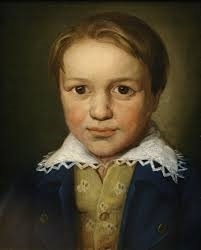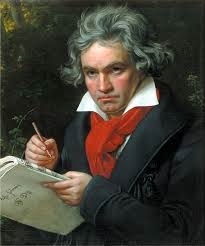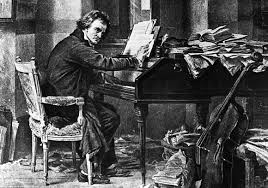 |
| Beethoven as a child. (Wikipedia. Wikimedia Foundation, n.d. Web. ()) |
Beethoven's passion for music was unique because he had to deal with a major conflict that worked against his love for music: losing his hearing. Imagine a dancer with a broken leg; an artist who has lost their sight. These seem like tragic situations, but Beethoven didn't let that stop him.
Beethoven was a hero because he could think creatively, he fought through a difficult conflict with losing hearing. His music is still individual and relevant today, which shows how influential his style is. He is a hero to me personally because music is something that is important in my life. To see Beethoven fight through something that causes a great challenge to enjoy music shows to me that he made life worth it by being brave. He fought through depression and even suicidal thoughts at some points because of his developed hearing loss, but he kept sharing his music with the world until his death.
 |
| Beethoven during his success as a composer. (Wikipedia. Wikimedia Foundation, n.d. Web. ()) |
Through all of Beethoven's life, music had been a passion of his, as well as a career path he knew he wanted to pursue.
Beethoven was born in 1770 in Belgium, and he became interested in music at a very early age. When he was 20 years old, he moved to Bonn, Germany and became a bass singer at the court of the Elector of Cologne. After gaining some experience, he eventually became the music director there.
After studying with Joseph Haydn for some time in Bonn, they both traveled to Vienna in 1792. He studied the works of many artists such as Mozart and Ignaz Schuppanzigh with the original intent to learn to perform. By 1793, he was known in Vienna as an improviser and a pianist performer. Around 1795, he was writing and performing string quartets, and had finally completely transformed into a composer. Since he learned from musical figures of the classical era, but he had his own unique style, he was one of the major composers who transformed music from the classical era into the romantic era. Today, he is famously known for writing 9 symphonies, 5 piano concertos, 1 violin concerto, 32 piano sonatas, and 16 string quartets.
 |
Although Beethoven was increasingly successful, he began to lose his hearing in 1796, when he was 26 years old. The reason for his hearing loss was never truly scientifically known, but it was described as a "distended inner ear" which developed lesions over time. Beethoven suffered from severe tinnitus, which caused a ringing in his ears and made it harder and harder to hear things over time. Music was often difficult to hear clearly, and he avoided conversations most of the time. In Vienna, he went to see a doctor to try to figure out if there was some way he could stop his hearing loss from getting any worse. There was no cure, and Beethoven knew this would continue to be a conflict with his passion for music.
During this time Beethoven had written a letter to his brothers about his thoughts of depression and suicide because he knew he'd never be able to hear music like he had before the hearing loss. However, he didn't give up; he continued his music career because he knew he needed to give more of his music to the world. He continued to write music even after performing his Ninth Symphony in 1824 and not turning around because he couldn't hear the audience cheering at the end.
1812 was the last year Beethoven could fully hear higher frequencies of pitch at 42 years of age. During 1812 and later he still wrote and performed many successful pieces such as Symphonies 7, 8, 9, and String Quartets 12 through 16. Beethoven wrote music until 1826, and died in March of 1827. Later in life, Beethoven heard music not with his ears, but with his knowledge of music theory. His hearing loss didn't affect his ability to write beautiful music because it's still known and played even today. His passion and hard work ruled over the great challenge that the hearing loss gave his life.
Beethoven was a hero because he could think creatively, he fought through a difficult conflict with losing hearing, and he was intelligent because his music is still relevant today.
Page created on 1/5/2016 12:00:00 AM
Last edited 11/14/2018 10:29:41 PM
Knapp, David. "Music received.." Notes 72.2. 2015. 426+.
Ferencz, Jane Riegel. ""Political Beethoven."." Notes 72.2. 2015. 341+
Magarotto, Matteo. ""The Oxford Handbook of Topic Theory."." Notes 72.2. 2015. 384+
